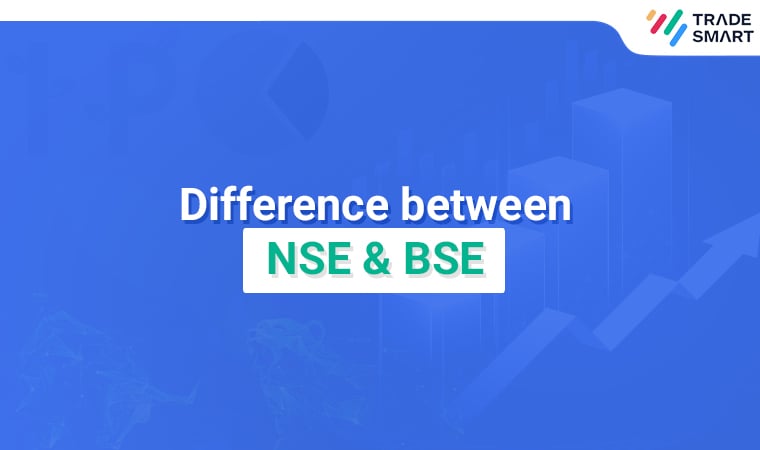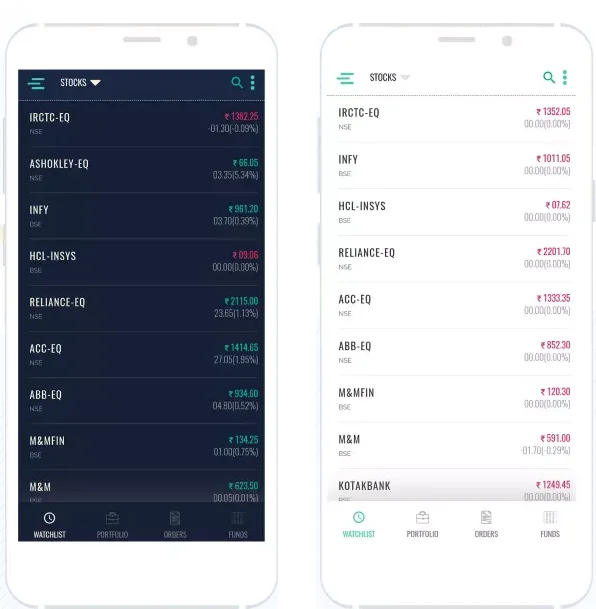NSE vs BSE – Which is Better?
Feb 16 2022 4 Min Read

Looking at the Scope of a Stock Exchange
A stock exchange fosters the trade of varied securities including shares and bonds. Investors and traders alike navigate the stock exchange in the hopes of scoring a profit and generating a return on their investment. Those seeking to make trades can take on the help of brokers and agents or may proceed to make trades themselves. The stock exchange can be characterized as a marketplace that is organized and regulated and encourages varied financial activities including the issuance, sale and purchase of shares. Via the stock exchange, it is possible for companies to raise money. It also plays an important role in setting up the economy of a nation as it allows for the sale of derivatives as well as security debts.
Organizations and investors hoping to invest can make important decisions with the aid of real-time pricing data made available by the stock exchange. Listed companies, however, are required to adhere to certain rules and regulations if they hope to raise capital.
India’s two major stock exchanges are the Bombay Stock Exchange (or BSE) and the National Stock Exchange (or NSE). This article seeks to understand the differences that exist between the two.
An Overview of the National Stock Exchange
Founded in 1992, the NSE is one of the country’s newer stock exchanges. This exchange received its big break in 1993 as it enabled the trading industry to take advantage of its entirely automated, screen-based and most, importantly, electronic systems. Since 1995 the NSE has made available to the public a secure platform that allows for the trade of shares and bonds. The introduction of this electronic system helped remove the paper-based trading system that was previously in place.
Nifty-50 which is the NSE benchmark index was launched in 1995-96. April 1996 saw the introduction of the Nifty which tracks the 50 most liquid stocks that are constantly traded (and listed) on the NSE. By keeping tabs on the Nifty 50, you can better understand prevailing economic trends. This index can also help investors determine what stocks are viable investments.
An Overview of the Bombay Stock Exchange
Recognized as not just the oldest stock exchange in India, but in Asia, the BSE come into being in the year 1875. Ever since, they have made available high-speed trading instruments including derivatives, mutual funds, currencies, equity, and debt instruments. Founded by Premchand Roychand, this exchange was previously called the Native Share and Stock Brokers Association.
BSE only gained recognition by the Central Government of India in 1957 as the country’s premium stock exchange. The benchmark index of this exchange is the SENSEX (which is a play on the words sensitive index) and is the country’s first equity index. This index keeps tabs on the 30 largest companies that are listed on the BSE and are its frontrunners. These companies hail from more than 10 sectors and showcase the prevailing trends in the Indian economy as well as the stock market as a whole.
NSE or BSE – Which Exchange is Better?
While there exist only a few minor differences between the National Stock Exchange and the Bombay Stock Exchange, it is important to be careful in terms of selecting which exchange to trade on. This holds particularly true in the case of new investors. Beginners who have limited to no experience trading are advised to first navigate BSE’s waters as the NSE is best suited to seasoned investors. The NSE is appropriate for day traders who are capable of and enjoy taking on risks.
Tabulating the Differences between the NSE and the BSE
Examine the table mentioned below to gain insight into the varied ways in which the country’s two leading exchanges differ from one another.
| Area of Consideration | NSE | BSE |
| Summary | The National Stock Exchange serves as the country’s largest stock exchange that provides a screen-based, electronic and entirely automated trading system to interested traders, companies, organizations and investors to utilize. | The Bombay Stock Exchange is the country’s oldest and first stock exchange. In fact, it happens to be the oldest stock exchange in India and offers its clientele high-speed trading opportunities. |
| Date of Establishment | Although this stock exchange was founded in 1992 it only gained credence in 1993. | While this exchange was incorporated in 1875, it was only recognized as a premier stock exchange by the Central Government of India in 1957. |
| Ranking | NSE ranks as the world’s 11th largest exchange in cash market and largest in derivatives in the world. | BSE is ranked number 11 in the world’s largest stock exchange rankings in cash segment. |
| Benchmark Index | Nifty 50 is the NSE’s benchmark index.
Of the 1600+ stocks listed on the NSE, this index tracks 50 of the largest companies whose stocks are the most liquid. |
The benchmark index for the BSE is the SENSEX which is comprised of the leading 30 largest companies that are listed under the BSE.
The SENSEX is the country’s first equity index. |
| Network | The NSE network is present in over 1500 cities. | The BSE network extends across 450 cities. |
| Companies Listed | Approximately 1700 companies are listed on this index. | Approximately 5800 companies find themselves listed on the BSE. |
| Liquidity | The NSE is more liquid in comparison to the BSE owing to the greater trading volume it experiences. | The liquidity level of the BSE is comparatively lower than that of the NSE. |
| Market Capitalization | NSE’s market capitalization amounts to Rs. 253.029 lakh crore as of August 2021*. | The market capitalization of this index amounts to nearly Rs. 276.713 lakh crore*. |
| Products | Products traded on the NSE include offer for sale, equity, institutional placement program, currency, mutual funds, initial public offering, traded funds, corporate bonds, security lending and borrowing schemes. | Products traded on the BSE include offer for sale, initial public offering, currency, equity, corporate bonds, commodity derivatives, mutual funds and traded funds. |
| Vision | This exchange is committed to improving the financial well-being of individuals and seeks to always be a leader and establish a global presence for itself. | This exchange seeks to be the country’s premium stock exchange that boasts of the best-in-class global practices with regard to its customer service, product innovation, and most importantly, the technology it incorporates. |
| Ideal Investor Profile | This exchange is best suited to those who have a high threshold for risk and are seasoned investors.
Day traders often like trading on the NSE as it has a comparatively higher level of liquidity. |
This exchange is better suited for those who have limited to no experience trading.
It also features new companies to invest in. |
*source: wikipedia
Summing Up
The NSE as well as the BSE are key players with regard to the Indian economy and play a major role in shaping it. They also help develop the country owing to which their importance cannot be minimized. Countless traders and brokers navigate these exchanges on a daily basis in the hopes to profit from their transactions. Each of these exchanges is located in Mumbai which is the country’s commercial capital.
Frequently Asked Questions
While there exist only a few minor differences between the National Stock Exchange and the Bombay Stock Exchange, it is important to be careful in terms of selecting which exchange to trade on. This holds particularly true in the case of new investors. Beginners who have limited to no experience trading are advised to first navigate BSE’s waters as the NSE is best suited to seasoned investors. The NSE is appropriate for day traders who are capable of and enjoy taking on risks.
Although the NSE has far fewer stocks listed on it in comparison to the BSE, the liquidity present in NSE’s listed companies is superior to that of the BSE’s. Liquidity here refers to the ease with which stocks can be converted into cash.
Yes, so long as you have a depository (or DEMAT) account it is possible to buy stocks via the BSE and sell them on the NSE. It is, however, worth wondering why someone would choose to do this as the process of buying stocks on the BSE to sell them on the NSE poses several risks. Almost all individuals are likely to stick to secure returns rather than unnecessarily expose themselves to risks.
Investors can conduct transactions on any exchange keeping in mind their needs, requirements and desires. That being said, beginners should ideally invest in the BSE which also happens to list tons more stocks in comparison to the NSE. Season investors and day traders on the other hand often prefer using the NSE owing to the comparatively higher level of liquidity it has in contrast to the BSE.
The benchmark indexes of the two exchanges are as follows.
- Nifty 50 is the NSE’s benchmark index. Of the 1600+ stocks listed on the NSE, this index tracks 50 of the largest companies whose stocks are the most liquid.
- The benchmark index for the BSE is the SENSEX which is comprised of the leading 30 largest companies that are listed under the BSE. The SENSEX is the country’s first equity index.

